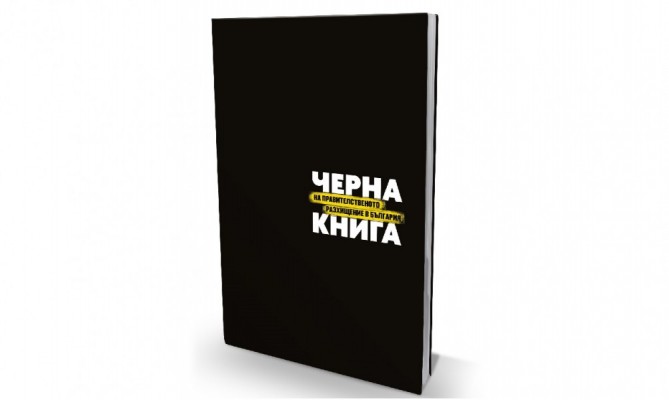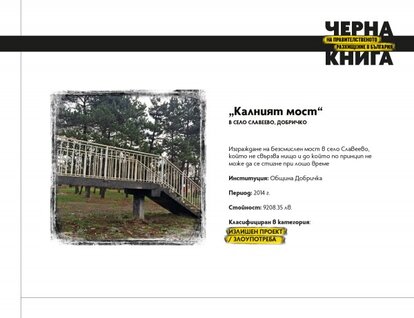Black Book
The Black Book of Government Waste in Bulgaria 2015

Every year Bulgaria aims for a record high absorption of EU funds. State money is also spent until the last Bulgarian cent, which motivates politicians to take on debts one after another, dooming the state debt to reach its highest-ever level of 30% of GDP in 2016. With some demanding more infrastructure projects and others better social benefits, society at large relies increasingly on the state for the provision of services and for its well-being.
Often, however, people seem to forget that all money spent by the state is practically their own taxpayers’ money. To remind them and to provoke a profound interest in how their money is spent, the Project Office for Southeast Europe of the Friedrich Naumann Foundation for Freedom, in cooperation with the Bulgarian Libertarian Society and the Institute for Market Economics published the “Black Book of Government Waste in Bulgaria” – the first booklet of its kind in this country, which raises the awareness of the squandering and the misuse of national and European taxpayers’ money by describing notable cases of ineffective public spending. The general idea for the book was taken from the annual edition of the German Taxpayers’ Association, which has become so popular that no institution would like to have its name found amongst the ones reported, according to Matthias Warneke, President of the Association. With just ten cases, this pioneering Bulgarian version is much shorter than the German edition, but provides unprecedented food for thought for state officials and for all of us, as taxpayers. To give the reader a comprehensive insight into the manner of spending, the authors selected a palette of projects administered at the national and local levels, funded either by the national budget or by the European Union, including those with both large and small budgets.

What can the reader expect from the book?
Some of the cases have already become popular in the public domain by their absurdity - for instance, “The bridge in mud”, constructed in Slaveevo village, Region Dobrich. Due to recurring floods, the people there demanded a bridge but the end result is far from what they expected. When the weather is dry, there is no need for the people to use it, and when it rains, water floods the entire area, including the bridge, making it a useless construction in the middle of a mud puddle. In addition, a conflict of interest involving a member of the municipal council, whose construction company implemented the project, was also part of the scandal. On the other hand, promoting Bulgaria as a tourist destination and attracting visitors to the country have become part of a national strategy worth millions of Euro in the recent years. Vast resources have been spent on advertising sites with no real touristic potential or on locations that lack basic infrastructure and are impossible to be visited. The tip of the iceberg was a public tender worth 1.5 million Euros for the design and promotion of a tourist logo for the country – a project financed under the EU Regional Development Operational Programme. The creation of the logo took two years and the end result resembled the logo of Kazakhstan (designed a bit earlier and for just 600 Euros). In the end, the logo was not used and Bulgaria was fined by the European Commission 80,000 Euros for the inadequate execution of this project. Another glaring example from the Black Book is the state sanitation programme, under which state subsidies are provided for the external renovation of residential buildings. “In fact, it is a huge programme, worth 1 million Euros, designed to solve private problems of a small part of the population with our taxpayers’ money,” commented Stoyan Panchev, author of the publication and chair of the Bulgarian Libertarian Society. In addition, the local administrations executing the programme remain the direct contractors of the construction companies, not allowing the residents to have the final say on the quality, design, and cost-effectiveness. Another case is a contract worth 300,000 Euros for a survey of the “public perception of the state of the road network” awarded by the National Road Infrastructure Agency. The results of this survey were supposed to serve as a basis for the 2014-2018 World Bank Action Plan for the Agency in Bulgaria. In this case, the reader will be stunned not only by the total cost of the public survey, but also by its unreasonable project approach – a survey of public perceptions, instead of an objective expert study.
"We wanted to include different types of cases, about which people would think: “this is a lot of money spent on nonsense”, but also ones showing small amounts wasted at the local level, so people could feel directly connected,” noted Daniel Kaddik, Director of the Project Office for Southeast Europe of FNF, “the problem goes in two ways: first, people in Bulgaria are not aware of the taxes they pay and second - public spending is an abstract topic. People want the state to spend money, but they do not directly relate this money to their tax contributions and do not think of how they could exercise effective control over this spending.”
Citizen`s control over public spending
Public discussion: Public Spending and Citizens` Control
The Black Book was officially presented to the public on 9 December 2015 in Sofia, Bulgaria, as a part of a public discussion on public spending and the need for better scrutiny of state expenditures. Latchezar Bogdanov, Managing Partner at Industry Watch-Bulgaria, Petar Ganev, Senior Economist with the Institute for Market Economics, Stephan Anguelov, member of the legal team of the Assess to Information Programme, and civil activists highlighted the need for stronger civil engagement in all areas of public life, including public spending. “With the Black Book we strive to provoke the interest and the curiosity of the people; they will then become hungry for changes, which eventually, they will take up with on their own,” highlighted Daniel Kaddik. In his turn, Matthias Warneke explained the experience of the German Taxpayers’ Association and how they rely predominantly on local activists for reporting cases on the national level, an approach which could be used for the next edition of the Bulgarian Black Book as well.
Indeed, it is an ambition of the Friedrich Naumann Foundation for Freedom and the authors to turn this book into an annual publication. Still, this effort also requires the citizens of Bulgaria. Therefore, the Black Book is also an offer to work together for a more transparent Bulgaria, a Bulgaria accountable to its citizens.
The Black Book of Government Waste in Bulgaria 2015 can be downloaded for free here.
